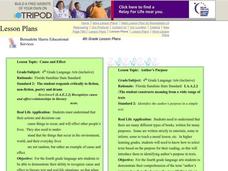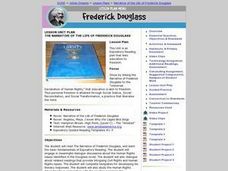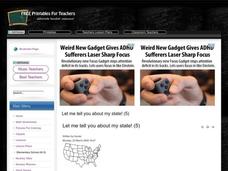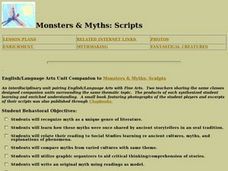Curated OER
Women Writers and Dissent in 20th and 21st Century American Literature
Tenth graders read examples of writings by women authors showing their dissent. After completion of their reading, they brainstorm on why they believe female authors have criticized society. In groups, they use the Internet to research...
Curated OER
Literary Wizardry
Students discuss what they already know about the Harry Potter series. After reading an article, they examine a critic's reaction to the latest book in the series. As a class, they brainstorm what parts of their school day could use...
Curated OER
Seeing Art in Historical Context: An Activity to Promote Visual Literacy
Students consider works of art in their historical context. In this art in historical context lesson, students are encouraged to think about and record their prior knowledge of the historical period and to make inferences about the...
Curated OER
Slums in the Spotlight: Will the Millennium Development Goals’ Target be Met?
Students examine the conditions of slums in the world. In this critical thinking skills lesson, students compare the places that people live in the world as they view scenes from the film "Slumdog Millionaire." Students also examine...
Curated OER
Author's Purpose
Fourth graders read the book Talkin' About Bessie and write a paragraph about the author's purpose. In this author's purpose lesson plan, 4th graders include examples from the story.
Curated OER
The Narrative of the Life of Frederick Dou
Ninth graders explore the concept that education is related to freedom. In this human rights lesson, 9th graders read The Narrative of Frederick Douglass. Students dialogue about their readings and education as it relates to human...
Curated OER
Some People Just Don't Get It
In this daily mind builders activity, students use inferential reasoning and deduction. Students read a short passage and respond to 6 short answer questions stating their own opinion and providing evidence to support their...
Curated OER
Myths, Folktales & Fairy Tales
Students relate the myth genre to history and culture. In this myths lesson plan, students compare culture in the past and present. Students answer critical thinking questions and discuss the unique characteristics of...
Curated OER
Let Me Tell You About My State
Fifth graders research one of the 50 U.S. States that they were unfamiliar with. In this U.S. Geography lesson, 5th graders utilize encyclopedias as well as the Internet to research a chosen U.S. State in order to write a report....
Curated OER
Elements of Myth
Students read and act out myths. In this world mythology lesson, students read and analyze myths from various cultures and then recognize their attributes as they prepare presentations of myths that explain natural phenomena.
Curated OER
Poet Naomi Shihab Nye
Students read and analyze poetry by Naomi Shihab Nye. They define stereotypes, view and discuss a video interview with Nye, present an oral reading of a poem, and write a persuasive letter to an author.
Curated OER
MONSTERS AND MYTHS: SCRIPTS /SCULPTS
Seventh graders are introduced to myths formed by many cultures as a unique genre of literature. They use critical thinking skills to compare and contrast mythic tales, compare versions of the same story, and respond to literature in...
Curated OER
Current Events and the Constitution
Understanding the Constitution is critical to helping students become valuable and engaged members of society.
Curated OER
PARAMILITARY VIOLENCE AND THE CONFLICT IN NORTHERN IRELAND
Young scholars examine documents to reconstruct the past, employ processes of critical historical inquiry to reconstruct the past, analyze aspects of the Northern Iereland conflict through perspectives of documents, and write a short...
Curated OER
The Shapes of Our World
Students utilize shapes and spatial relationships in a practical context by creating maps and writing a critical essay.
Curated OER
School Newspaper
Fifth graders write a website based school newspaper using a variety of literary forms to present the news of the school.
Curated OER
Literature: Isabel Allende
Students watch and respond to a Bill Moyers Now video on the Chilean author, Isabel Allende. They brainstorm a list of recent events that might inspire writers and choose one to write about in poetic, diary, or short story form.
Curated OER
Math Maven Fractions
Students solve fraction mysteries. In this fractions lesson, students read Math Maven's Mysteries and use problem-solving and critical thinking skills to solve the mysteries.
Curated OER
Monster and Myths: Scripts
Students explore characteristics of the myth genre. In this myth lesson, students become familiar with various myths and the cultures they were derived from. Students compare in a graphic organizer. Students write...
National Endowment for the Humanities
Seeing Sense in Photographs & Poems
Learners analyze photographs and poetry as forms of each other. In this poetry and photography analysis instructional activity, students use the photographs of Alfred Stieglitz and poetry from William Carlos William to explore how poetry...
Curated OER
Author of the Month
Fourth graders research authors on the Web each month in based on the themes in their reading book. They create an author booklet which includes a picture and biographical information.
Curated OER
"We, the People": New Voices in the Constitutional Debates
Students study the goals set out for the Constitution. They examine the resolutions arrived at to resolve three major conflicts which arose during the writing of the Constitution. They discuss or write down a one-sentence summary of...
Curated OER
Choose Your Path
Students identify the plot and theme of cartoons. In groups, they discuss and compare the written and movie versions of popular fairy tales. Individually, they write their own fairy tale and share them with the class. They write their...
Curated OER
Exploring War Themes in Art and Poetry
What is war? Students discuss the ethical dilemma of war by viewing Picasso's painting entitled "Guernica" and write down everything they see in the painting. Then they choose one emotion that best summarizes their emotional response to...























